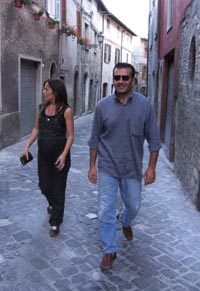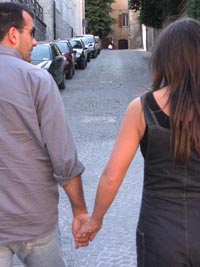 Giampietro Chegai and his wife, Daniela, sit comfortably sipping white wine and enjoying their time together in their small apartment tucked away on a quiet street in Cagli. Giampietro Chegai and his wife, Daniela, sit comfortably sipping white wine and enjoying their time together in their small apartment tucked away on a quiet street in Cagli.
It is one of the few moments each week that the couple spend together.
Giampietro, 37, travels each week to Rome, staying Monday through Friday to run his own pest control company, while Daniela, 39, stays at home in Cagli.
“The fact is I get more satisfaction personally,” he says of being able to interact with more people on a daily basis, as he lounges on the window ledge and overlooking the narrow street where the couple lives.
“There are three million people who live in Rome. In Le Marche there are only 1.6 million. Rome has better business, personally, professionally. It is more satisfying, more personally stimulating,” he says.
As for Daniela, she has no plans to move to Rome. Daniela has lived in Cagli all her life, working as a secretary for a meat company for 17 years. Her only complaint is that her weekdays spent alone are often quiet and somewhat dull.
“I am settled down. Rome is chaotic. Cagli is much more relaxed and tranquil,” she adds.
Both husband and wife display that relaxation. Giampietro’s good looks are accented by a simple orange T-shirt and jeans, while Daniela’s beauty is evident in a comfortable maternity outfit, accentuating her bulging stomach.
Throughout their 10-year marriage, Giampietro and Daniela have not always been separated during the week. Giampietro has been working in Rome for the past four years. Before he started his commute, he worked for seven years in the province of Pesaro-Urbino. His week begins early on Monday morning long before the streets of Cagli are overrun by cars and people. He leaves at six in the morning and travels by train, arriving four hours later in Rome, where he stays with his parents.
 “Even though I stay with my parents in Rome, it is hard not being with my wife and child,” he says. “Even though I stay with my parents in Rome, it is hard not being with my wife and child,” he says.
He explains that being self-employed has allowed him to have no fixed schedule, but he doesn’t return to Cagli until 8 p.m. Friday.
“Just in time for dinner with my wife,” he added.
There are three ways to get to Rome from Cagli: car, bus or train. Rome is 150 miles from Cagli, about two and a half hours by car. Two buses leave from Cagli to Rome, taking anywhere from three and a half to four hours, depending on the number of stops the bus makes. The train from Fossato di Vico station, 23 miles outside Cagli, can take two to three hours, also depending on the number of stops.
By whatever means, the commuting always comes back to Cagli, its homes and its history.
“My father was born in this house, in this room,” Giampietro explains as he points to the house’s architecture, some of which dates to the 1300s.
“After World War II there was a huge emigration to Rome from small towns. Here in Cagli there were no jobs. My grandfather has a small truck and worked in the agricultural business.”
Giampietro’s father arrived in Rome in 1950; his mother from the nearby town Acquaviva emigrated to Rome in 1947. They met in Rome and returned to Cagli during the summers with their children. Daniela and her family have remained in Cagli.
The biggest challenge the couple expect is the arrival of their first child in early July, who will be named Adriano after an emperor of Rome, known in English as Hadrian.
How will the birth of the child affect his commute?
 “This is the $1 million question,” Giampietro replies as his hands rest upon Daniela’s round stomach. “This is the $1 million question,” Giampietro replies as his hands rest upon Daniela’s round stomach.
Giampietro thinks that his absence will create a void in his relationship with his son. He won’t be present for everyday occurrences in his son’s life. “This won’t mean that I won’t be present in my family. I have always been present in my family. Now I will be more present,” he adds.
Giampietro and Daniela have both decided that they will raise their son in Cagli. When Adriano has finished high school, they will give him the option of whether to stay.
“Cagli is a healthy place to raise a kid. It might be stupid to say, but the air is healthier. The water cleaner. Cagli has everything. But in a smaller environment for a kid that is growing up,” Giampietro adds. “Rome has the same things, but it’s chaotic. Cagli is a good place to live.” |
